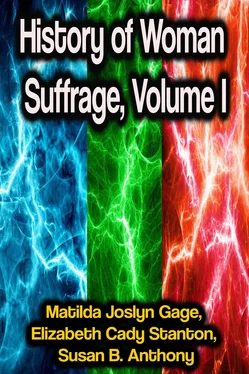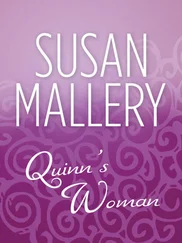As the winter was very severe, she was allowed to remain in Roxbury until spring, when she joined Roger Williams in Rhode Island, where she helped form a body-politic, democratic in principle, in which no one was "accounted delinquent for doctrine." Mistress Hutchinson thus helped to dissever Church and State, and to found religious freedom in the United States.
After her residence in Rhode Island, four men were sent to reclaim her, but she would not return. Upon the death of her husband she moved, for greater security, to "The Dutch Colony," and died somewhere in the State of New York.
Thus, through the protracted struggle of the American Colonies for religious and political freedom, woman bravely shared the dangers and persecutions of those eventful years. As spy in the enemy's camp; messenger on the battle-field; soldier in disguise; defender of herself and children in the solitude of those primeval forests; imprisoned for heresy; burned, hung, drowned as a witch: what suffering and anxiety has she not endured! what lofty heroism has she not exemplified!
And when the crusade against slavery in our republic was inaugurated in 1830, another Spartan band of women stood ready for the battle, and the storm of that fierce conflict, surpassing in courage, moral heroism, and conscientious devotion to great principles, all that woman in any age had done or dared. With reverent lips we mention the names of Sarah and Angelina Grimke, Lydia Maria Child, Maria Weston Chapman, Mary S. Parker, Abby Kelly, whose burning words of rebuke aroused a sleeping nation to a new-born love of liberty. To their brave deeds, pure lives, and glowing eloquence, we pay our tributes of esteem and admiration.
To such as these let South Carolina and Massachusetts build future monuments, not in Quincy granite, or Parian marble, but in more enduring blessing to the people; inviolable homesteads for the laborer; free schools and colleges for boys and girls, both black and white; justice and mercy in the alms-house, jail, prison, and the marts of trade, thus securing equal rights to all.
WOMAN'S EARLY POLITICAL RIGHTS.
In Massachusetts, women voted at an early day. First, under the Old Province Charter, from 1691 to 1780, for all elective officers; second, they voted under the Constitution for all elective officers except the Governor, Council, and Legislature, from 1780 to 1785. The Bill of Rights, adopted with the Constitution of 1780, declared that all men were born free and equal. Upon this, some slaves demanded their freedom, and their masters yielded.[31] Restrictions upon the right of suffrage were very great in this State; church membership alone excluded for thirty years three-fourths of the male inhabitants from the ballot-box.[32]
That women exercised the right of suffrage amid so many restrictions, is very significant of the belief in her right to the ballot, by those early Fathers.[33]
THE FIRST STEP IN MASSACHUSETTS.
Woman's rights petitions were circulated in Massachusetts as early as 1848. Mary Upton Ferrin, of Salem, in the spring of that year, consulting Samuel Merritt, known as "the honest lawyer of Salem," in regard to the property rights of married women, and the divorce laws, learned that the whole of the wife's personal property belonged to the husband, as also the improvements upon her real estate; and that she could only retain her silver and other small valuables by secreting them, or proving them to have been loaned to her. To such deception did the laws of Massachusetts, like those of most States, based on the Old Common Law idea of the wife's subjection to the husband, compel the married woman in case she desired to retain any portion of her own property.
Mrs. Ferrin reported the substance of the above conversation to Mrs. Phebe King,[34] of Danvers, who at once became deeply interested, saying, "If such are the laws by which women are governed, every woman in the State should sign a petition to have them altered."
"Will you sign one if drawn up?" queried Mrs. Ferrin.
"Yes," replied Mrs. King, "and I should think every woman would sign such a petition."
As the proper form of petitions was something with which women were then quite unfamiliar, the aid of several gentlemen was asked, among them Hon. D. P. King and Judge John Heartley, but all refused.
Miss Betsy King then suggested that Judge Pitkin[35] possessed sufficient influence to have the laws amended without the trouble of petitioning the Legislature. Strong in their faith that the enactment of just laws was the business of legislative bodies, these ladies believed they but had to bring injustice to the notice of a law-maker in order to have it done away. Therefore, full of courage and hope, Judge Pitkin was respectfully approached. But, to their infinite astonishment, he replied:
"The law is very well as it is regarding the property of married women. Women are not capable of taking care of their own property; they never ought to have control of it. There is already a law by which a woman can have her property secured to her."
"But not one woman in fifty knows of the existence of such a law," was the reply.
"They ought to know it; it is no fault of the law if they don't. I do not think the Legislature will alter the law regarding divorce. If they do, they will make it more stringent than it now is."
Repulsed, but not disheartened, Mrs. Ferrin herself drew up several petitions, circulated them, obtaining many hundred signatures of old and young; though finding the young more ready to ask for change than those inured to ill-usage and injustice. Many persons laughed at her; but knowing it to be a righteous work, and deeming laughter healthful to those indulging in it, Mrs. Ferrin continued to circulate her petitions.
They were presented to the Legislature by Rev. John M. Usher, a Universalist minister of Lynn, and member of the lower House. Although too late in the session for action, these petitions form the initiative step for Woman Suffrage in Massachusetts.
Early the next fall, similar petitions were circulated. It was determined to attack the Legislature in such good season, that lateness of time would not again be brought up as an excuse for non-attention to the prayers of women. Mrs. King's interest continued unabated, and through her advice, Mrs. Ferrin prepared an address to accompany the petitions. Hon. Charles W. Upham, minister of the First Unitarian church of Salem, afterward Representative in Congress, was State Senator that year. From him they received much encouragement. "I concur with you in every sentiment," said he, "but please re-write your address, making two of it; one in the form of a memorial to the Legislature, and the other, an address to the Judiciary Committee, to whom your petitions will be referred." These two documents will be found to suggest most of the important demands, afterward made in every State, for a change of laws relating to woman. The fallacy of "sacredness" for these restrictive laws was shown; the rights of humanity as superior to any outside authority, asserted; and justice made the basis of the proposed reformation. The right of woman to trial by a jury of her peers was claimed, followed by the suggestion that woman is capable of making the laws by which she is governed. The memorial excited much attention, and was printed by order of the Legislature, though the possibility of a woman having written it was denied.[36]
But in 1850, as in 1849, no action was taken, the petitioners having "leave to withdraw." Petitions of a similar character were again circulated throughout Salem and Danvers, in 1850, '51, '52, '53, making six successive years, in each of which the petitioners had "leave to withdraw," as the only reply to their prayers for relief. The Hon. Mr. Upham, however, remained woman's steadfast friend through all this period, and Mrs. Phebe Upton King was as constantly found among the petitioners.
Читать дальше












